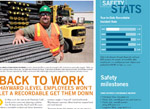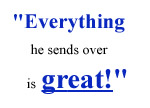 Mark Ziegler appreciates his mother, Dolores, even more following her near-fatal car accident.
Mark Ziegler appreciates his mother, Dolores, even more following her near-fatal car accident.
Remembrances for
Mother's Day
Working Solutions helps make the
holiday special for this Boeing employee
By Mark Ziegler
Boeing News
"C'mon Mom, hang in there."
I must have uttered that simple line 40 or 50 times that August night. I couldn't figure out anything else to say.
My mother, Dolores -- the victim of an auto accident -- was lying in the intensive care unit of a Seattle-area hospital. There was a good chance she was going to die in front of me.
I had received a call at work notifying me of the accident. Surgery for numerous internal injuries seemingly had gone fine, but she was bleeding internally. The doctors faced a difficult choice. Unchecked, the bleeding could kill her; a second surgery could also be fatal. They decided to wait.
The next two days were excruciating. An exploratory procedure took so much longer than anticipated that I thought she had passed away. The doctors never found the source of the bleeding, which slowly stopped by itself. The immediate crisis was over. But a few days later, it was replaced by another, more long-term crisis which would ultimately lead to other dilemmas.
From this point on, an outside vendor supplied by The Boeing Company -- Working Solutions -- was instrumental in getting me the information I needed as I confronted some of the most difficult situations I'll probably ever face.
Mom developed a condition referred to as shock of the lungs. As the only child of a single parent with few living relatives, I was advised to begin preparing myself to make the ultimate decision, if necessary, as to whether life support should be terminated.
Thus began the long wait.
Instantly, there were the lives of two people to live. There was a team of medical consultants to consult, files to scour for medical histories, several insurance companies to deal with, creditors to contact, an ailing cat to care for, and a job at Boeing to perform as best I could.
Uncertainty made financial decisions tricky. I didn't have legal access to Mom's finances. If this lasted many months, I probably couldn't carry the expenses of both households. As I looked for answers, people made suggestions. Confused, I called Working Solutions.
The Working Solutions counselor described possible options to me, such as legal guardianship, and offered names of services and attorneys. She also sent me a packet of brochures giving me greater insight into my alternatives.
Mom stabilized, slowly improving over the next two months. Then her worst nightmare became a possibility. The doctors prepared her to breathe on her own. Except she wasn't coming to.
The worst possible scenario was that she had a closed-head injury and it could take a year to determine if she would be a mental six-year-old permanently.
I was beside myself. My mom had always been very vocal about quality-of-life issues. She had a living will, but such documents don't address such an unusual situation. Nor does our legal system.
I had spent two months hoping against hope that my mom would live. Cruelly, suddenly, as her sole advocate, I had to search out what her rights were in case she was about to be saved into a condition where she would prefer to die if she were able to make such a judgment herself. And I had to forcefully state her views to a medical team that didn't really know me and probably couldn't be entirely certain of my motivations.
Under these awkward circumstances, Working Solutions and others were invaluable. I received the names of several advocacy groups and lawyers, and I received the information very quickly. Those referrals gave me the answer I probably expected. There wasn't much I could do. But, at least I knew.
Fortunately, Mom woke up after about a week. And then another crisis was upon us. Her medical insurance only paid a nominal amount for rehabilitation. Therapy at a rehab center or nursing home could take from three to 12 months; the insurance would be used up in a week or two. Mom was too young to qualify for Medicare, and to qualify for Medicaid she would have to "spend down" her assets, possibly going broke.
The maneuvering necessary to prevent a parent from meeting such a fate is extremely complex. Yet again, Working Solutions provided important tips down a path that led, thankfully, to a resolution.
Mom's difficult rehab went well. Once she reconstructed her body, she came home and began the process of reconstructing her life, which had changed dramatically. A few years later, things are much better now.
Each Mother's Day, my thoughts inevitably drift back to a family I met in intensive care. Their mom's injuries and circumstances were similar to my mom's. However, they lost their mother; I got mine back. During such recollections, I am humbled by the randomness of life. And thankful to the many good people -- including the folks at Working Solutions -- who help us through its sometimes tumultuous events.
Writer's postscript:
This article, written in 1998 about an incident five years earlier, is dedicated to the memory of my mother, Dolores Ziegler. She showed great courage and determination in overcoming the severe injuries described here.
I eventually learned just what a miracle her survival represented; at the time, only 2 percent of patients survived her condition. Several nurses have told me that not a single patient of theirs ever survived. The ailment, known as Acute Respiratory Distress Syndrome (ARDS), is the same that afflicts many of the worst COVID patients who must go on ventilators, except her episode was caused by the accident and bodily trauma. Fortunately, ARDS treatments and survival rates have improved greatly over three decades, but your odds are still 50/50.
Despite only having 39 percent of lung capacity left, my mom went on to enjoy perhaps her happiest years, close to me in suburban Seattle, until succumbing to brain cancer in 2003.
This article, as shown above, is what was originally submitted to Boeing News, with the editing assistance of longtime friend and co-worker, Christine White. Unfortunately, an editorial decision was made by the paper to shorten and "add a little punch" to the last paragraph, without my advance knowledge or approval. The resulting article, and its conclusion, was considered by many readers to be offensive and insensitive toward the other family mentioned in the ending as revised. The paper obviously didn't mean to do it; someone simply made one of the worst editing choices I've ever seen.
And thus, as printed, the altered article became a source of deep embarrassment for me. But it also became a useful professional lesson in three ways.
First, as a journalist, whatever you do, be careful with the words others give you. Use them -- and edit them -- very carefully.
Second, as a subject or (temporary) public figure, develop a very thick skin.
Lastly, as a human being, learn to forgive. For, as my late mom's two brushes with death demonstrate, we're only here for so long.





